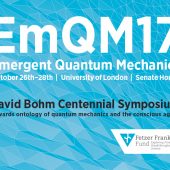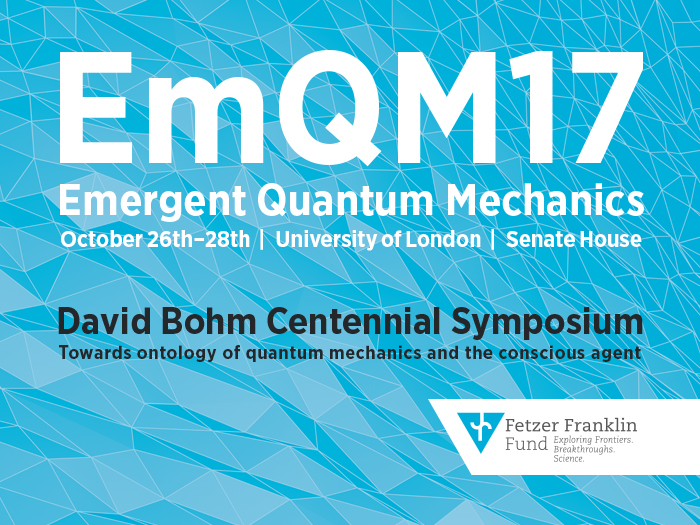Forthcoming: EmQM17 – The David Bohm Centennial Symposium

As the lead agency for the Fetzer Franklin Fund we are very proud to announce the EMQM17 Symposium in London this year. On the occasion of David Bohm’s 100th birthday, a symposium on emergent quantum mechanics will be held at the University of London, Senate House, on October 26 – 28, 2017. This special issue […]

As the lead agency for the Fetzer Franklin Fund we are very proud to announce the EMQM17 Symposium in London this year.
On the occasion of David Bohm’s 100th birthday, a symposium on emergent quantum mechanics will be held at the University of London, Senate House, on October 26 – 28, 2017. This special issue features expert views that critically evaluate the prospects and significance – for 21st century physics – of ontological quantum mechanics, an approach which David Bohm helped pioneer. In original de Broglie-Bohm theory, the mathematical formalism refers to hypothetical ontic elements (e.g., John Bell’s “beables”) such as the quantum potential. In the 21st century, realist quantum approaches often distinguish between ψ-epistemic and ψ-ontic ontological quantum theories. Unlike ψ-ontic theories, the ψ-epistemic theories do not view the wave function ψ as a state of reality. Nevertheless, both types of approaches posit – again – the possibility of an ontological foundation for quantum mechanics.
- For information about the EmQM17 David Bohm Centennial Symposium please visit www.emqm17.org.
- For information on the Fetzer Franklin Fund please klick here.
About Emergent quantum mechanics (EmQM)
Emergent quantum mechanics (EmQM) is a research program that explores the possibility of an ontology for quantum mechanics. The resurgence of interest in realist approaches to quantum mechanics, including deterministic and indeterministic ones, challenges the standard textbook view. For example, standard “no-go” theorems against the possibility of realist, i.e., ontologically-grounded, quantum mechanics are increasingly recognized as falling short of their stated aim. Recent work also indicates that traditional assumptions and theorems such as nonlocality, contextuality, free choice, and non-signalling, need not necessarily contradict the existence of certain quantum ontologies.

 Dear friends. We are a German / Japanese design company and want to invite you to join our art project which is based on our inspirational trips all over the world. The purpose is to give and share inspiration, thoughts and good will from all over the world. No money involved.
Dear friends. We are a German / Japanese design company and want to invite you to join our art project which is based on our inspirational trips all over the world. The purpose is to give and share inspiration, thoughts and good will from all over the world. No money involved.
 Those who are interested in coatings and coating producers, will find us at the BASF event “Let’s talk paint”, from the 6th until the 7th of November. Under the title: Context Shift: Why paint brands will have to sell feelings instead of coatings if they want to be successful in the future, the founders of kakoii, Thekla Heineke and Stefan Mannes, will present marketing trends and solutions for the international coatings industry.
Those who are interested in coatings and coating producers, will find us at the BASF event “Let’s talk paint”, from the 6th until the 7th of November. Under the title: Context Shift: Why paint brands will have to sell feelings instead of coatings if they want to be successful in the future, the founders of kakoii, Thekla Heineke and Stefan Mannes, will present marketing trends and solutions for the international coatings industry.


